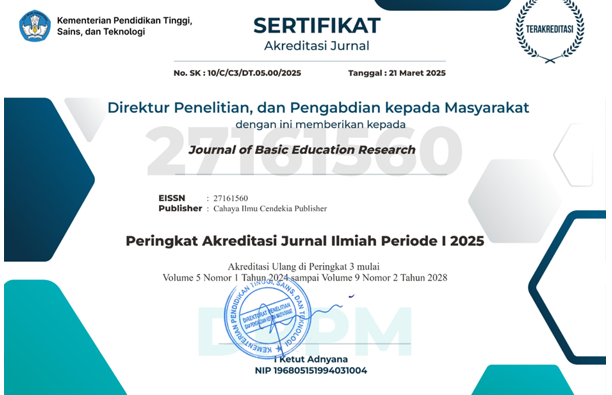Developing Indonesian Vocabulary Through the Application of the Mind Mapping Method in Children
Abstract
Purpose of the study: This study aims to investigate the effectiveness of implementing the mind map method in improving the Indonesian language vocabulary skills of children in Group B at Kindergarten School Al Khairiyah Kota Bandar Lampung.
Methodology: This research uses qualitative methods with classroom action research as the main tool to teach Indonesian vocabulary to 19 group B children at Al Khairiyah Kindergarten, Bandar Lampung City with total sampling. Data collection, namely observation, documentation and analysis, was carried out to assess the impact of the method on vocabulary acquisition.
Main Findings: In Cycle 1, the mind map method was applied in two meetings with a focus on the theme of food and drink, resulting in an increase in Indonesian vocabulary. Cycle 2 continued this approach with improvements to the clothing theme lesson, which resulted in significant improvements in students' understanding and response to the material. Overall, the application of mind map method proved effective in improving the Indonesian vocabulary skills of Group B children at Al Khairiyah Kindergarten, Bandar Lampung City.
Novelty/Originality of this study: This study contributes to the field by demonstrating the effectiveness of the mind map method in improving vocabulary acquisition among young learners. This research is offers practical insights for educators seeking innovative approaches to language teaching and learning, which have the potential to advance pedagogical practices in early childhood education.
References
W. H. Jeynes, “A Meta-Analysis on the Relationship Between Character Education and Student Achievement and Behavioral Outcomes,” Educ. Urban Soc, vol. 51, no. 1, pp. 33–71, 2019, doi: 10.1177/0013124517747681.
S. Vosniadou, “The Development of Students’ Understanding of Science,” Front. Educ, vol. 4, no. April, pp. 1–6, 2019, doi: 10.3389/feduc.2019.00032.
F. Özkan Yıldız and A. Yılmaz, “Parent-teacher communication and parental expectations in the assessment process in Turkish preschool settings,” Int. J. Primary, Elem. Early Years Educ, vol. 49, no. 6, pp. 761–775, 2021, doi: 10.1080/03004279.2020.1861049.
J. Sanguiliano, K. Anderson, S. Welcome, P. Hissom, B. Hannah, and N. Lovero, “Strong Families and Successful Students: A Qualitative Study of Families Involved in a Strength-Based Community Program,” J. At-Risk Issues, vol. 22, no. 1, pp. 19–27, 2019.
R. Novianti and M. Garzia, “Parental Engagement in Children’s Online Learning During COVID-19 Pandemic,” J. Teach. Learn. Elem. Educ, vol. 3, no. 2, p. 117, 2020, doi: 10.33578/jtlee.v3i2.7845.
N. L. A. Razzak, “Cultural factors impacting student motivation at a health sciences college in the Eastern province of Saudi Arabia,” Cogent Educ, vol. 3, no. 1, pp. 1–21, 2016, doi: 10.1080/2331186X.2016.1153214.
J. Junaedah, S. B. Thalib, and M. A. Ahmad, “The Outdoor Learning Modules Based on Traditional Games in Improving Prosocial Behaviour of Early Childhood,” Int. Educ. Stud., vol. 13, no. 10, p. 88, 2020, doi: 10.5539/ies.v13n10p88.
G. van der Aalsvoort, S. van der Zee, and T. de Wit, “Improving science skills by practicing geometry and measurement in Kindergarten,” Early Child Dev. Care, vol. 190, no. 4, pp. 537–548, 2020, doi: 10.1080/03004430.2018.1482889.
A. Chatzipanteli, V. Grammatikopoulos, and A. Gregoriadis, “Development and evaluation of metacognition in early childhood education,” Early Child Dev. Care, vol. 184, no. 8, pp. 1223–1232, 2014, doi: 10.1080/03004430.2013.861456.
S. Benes, K. M. Boyd, I. Cucina, and H. L. Alperin, “School-Based Health Education Research: Charting the Course for the Future,” Res. Q. Exerc. Sport, vol. 92, no. 1, pp. 111–126, 2021, doi: 10.1080/02701367.2020.1712315.
I. D. Rose et al., “Key Factors Influencing Comfort in Delivering and Receiving Sexual Health Education: Middle School Student and Teacher Perspectives,” Am. J. Sex Educ, vol. 14, no. 4, pp. 466–489, 2019, doi: 10.1080/15546128.2019.1626311.
G. R. Díaz Grijalva, B. Camarena Gómez, D. González Lomelí, and C. A. Mirón Juárez, “A structural model of the teaching practice and pro-environmental behavior in elementary Mexican students,” Int. Electron. J. Environ. Educ, vol. 11, no. 1, pp. 42–57, 2021, doi: 10.18497/iejeegreen.781808.
J. C. Richards, “Exploring Emotions in Language Teaching,” RELC J., vol. 53, no. 1, pp. 225–239, 2022, doi: 10.1177/0033688220927531.
P. Tschisgale, P. Wulff, and M. Kubsch, “Integrating artificial intelligence-based methods into qualitative research in physics education research: A case for computational grounded theory,” Phys. Rev. Phys. Educ. Res, vol. 19, no. 2, p. 20123, 2023, doi: 10.1103/PhysRevPhysEducRes.19.020123.
S. Fuller, “Education Diplomacy at the Intersection of Gender Equality and Quality Education,” Child. Educ, vol. 95, no. 5, pp. 70–73, 2019, doi: 10.1080/00094056.2019.1663103.
A. G. Amnie, “An Investigation of Predictors of Self-efficacy to Cope with Stress and Implications for Health Education Practice,” Am. J. Heal. Educ, vol. 49, no. 3, pp. 155–165, 2018, doi: 10.1080/19325037.2018.1431165.
V. Ornaghi, A. Agliati, A. Pepe, and P. Gabola, “Patterns of Association between Early Childhood Teachers’ Emotion Socialization Styles, Emotion Beliefs and Mind-Mindedness,” Early Educ. Dev, vol. 31, no. 1, pp. 47–65, 2020, doi: 10.1080/10409289.2019.1627805.
A. D. Saputra, F. Junaidi, and J. Ramdani, “Utilization of Videos Based on Local Wisdom of Surakarta as Learning Media for BIPA Students,” in International Conference on Studies in Education and Social Sciences, 2022, pp. 159–167.
S. Zubaidah, N. M. Fuad, S. Mahanal, and E. Suarsini, “Improving creative thinking skills of students through Differentiated Science Inquiry integrated with mind map,” J. Turkish Sci. Educ, vol. 14, no. 4, pp. 77–91, 2017, doi: 10.12973/tused.10214a.
G. Li and Y. Dong, “Dynamic modelling of the impact of public health education on the control of emerging infectious disease,” J. Biol. Dyn, vol. 13, no. 1, pp. 502–517, 2019, doi: 10.1080/17513758.2019.1639835.
C. Brenig, J. Schwarz, and N. Rückeshäuser, ‘Value of Decentralized Consensus Systems - Evaluation framework’, Eur. Conf. Inf. Syst., vol. 1, no. 1, 2016.
K. Saddhono et al., “Corpus Linguistics Use in Vocabulary Teaching Principle and Technique Application: A Study of Indonesian Language for Foreign Speakers,” Int. J. Soc. Cult. Lang, vol. 11, no. 1, pp. 231–245, 2023, doi: 10.22034/ijscl.2022.1971972.2823.
M. Maulidinah and A. Ekasari, “Application of E-Module to Identify Students’ Science Process Skills in the Practicum of Refraction on Prisms,” Schrödinger J. Phys. Educ, vol. 4, no. 2, pp. 30–35, 2023, doi: 10.37251/sjpe.v4i2.502.
S. Dang, M. Yudelson, and K. R. Koedinger, “Detecting diligence with online behaviors on intelligent tutoring systems,” Proc. 4th ACM Conf. Learn. Scale, vol. 4, no. 1, pp. 51–59, 2017, doi: 10.1145/3051457.3051470.
M. A. S. Malisi, “System of Educational Quality Assurance in High School,” vol. 400, no. Icream 2019, pp. 210–218, 2020, doi: 10.2991/assehr.k.200130.170.
A. Asrial, S. Syahrial, M. Maison, D. A. Kurniawan, and E. Putri, “Fostering Students’ Environmental Care Characters Through Local Wisdom-Based Teaching Materials,” JPI (Jurnal Pendidik. Indones, vol. 10, no. 1, p. 152, 2021, doi: 10.23887/jpi-undiksha.v10i1.27744.
J. M. Aldridge and K. McChesney, “The relationships between school climate and adolescent mental health and wellbeing: A systematic literature review,” Int. J. Educ. Res, vol. 88, no. January, pp. 121–145, 2018, doi: 10.1016/j.ijer.2018.01.012.
D. Izadi, J. Willison, N. Finkelstein, C. Fracchiolla, and K. Hinko, “Towards mapping the landscape of informal physics educational activities, Phys. Rev. Phys. Educ. Res, vol. 18, no. 2, p. 20145, 2022, doi: 10.1103/PhysRevPhysEducRes.18.020145.
K. Brandl, “Integrating internet-based reading materials into the foreign language curriculum: From teacher- to student-centered approaches,” Lang. Learn. Technol, vol. 6, no. 3, pp. 87–107, 2002.
R. Risnani, S. Sumarmi, and I. K. Astina, “Implementation of Project-Based Learning (PjBL) through One Man One Tree to Improve Students’ Attitude and Behavior to Support,” Int. Educ. Stud, vol. 10, no. 3, p. 134, 2017, doi: 10.5539/ies.v10n3p134.
Y. Ying, F. Ruomei, and P. M. Susilo, “Smart Word Aplication Design for Learning Mandarin-Indonesia Vocabulary,” J. Phys. Conf. Ser, vol. 1477, no. 4, pp. 2–9, 2020, doi: 10.1088/1742-6596/1477/4/042015.
Copyright (c) 2024 Eni Hasnawati, Eka Fitriyanti, Sharmin Ali Hasan, Shaimaa Ismail

This work is licensed under a Creative Commons Attribution-NonCommercial 4.0 International License.
Authors who publish with this journal agree to the following terms:
- Authors retain copyright and acknowledge that the Journal of Basic Education Research is the first publisher licensed under a Creative Commons Attribution 4.0 International License.
- Authors are able to enter into separate, additional contractual arrangements for the non-exclusive distribution of the journal's published version of the work (e.g., post it to an institutional repository or publish it in a book), with an acknowledgment of its initial publication in this journal.
- Authors are permitted and encouraged to post their work online (e.g., in institutional repositories or on their website) prior to and during the submission process, as it can lead to productive exchanges and earlier and greater citation of published work.





.png)


.png)
.png)


















